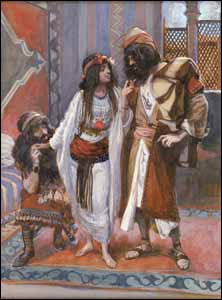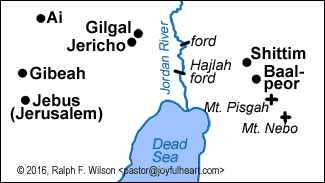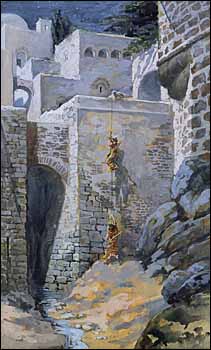
|
Podcast

|
Maturity
Encouragement
Good News
Church
Communion
Prayer
Christian Symbols
Scholarly Articles
Miscellany

|
Easter
Thanksgiving
Pentecost
Stations of the Cross

|
New Testament
Gospels
Acts
Paul's Letters
General Letters
Revelation
Topical Studies

|
Bible Studies
Articles
Books
Podcasts
Search
Menu
Donate
About Us
FAQ
Contact Us
Site Map
You're Israelites, Aren't You?
A Fictional Retelling of the Story of Rahab the Harlotby Dr. Ralph F. Wilson
 James J. Tissot, The Harlot of Jericho and the Two Spies' (1896-1902), gouache on board, 9 1/16x6 5/8 in, The Jewish Museum, New York. |
The knock at the door this evening was soft but persistent. Rahab looked up. Out the window she could see the silhouettes of two men. Customers. She was used to furtive nighttime visits by the townsmen.
Her's was a business, pure and simple — and legal, too. Oh, the wives in town shunned her, and her father had been deeply disappointed, she knew. But prostitution had brought her a good living, a house of her own, and an established place in Jericho society, albeit a less-than-respectable one.
The knock sounded again. Rahab opened the door and ushered the men inside.
"How may I serve you," she said with a wink in her most seductive voice. Maybe these strangers would become regulars.
The taller one spoke in a broken and halting way. "Do you have ... a place where we could stay overnight?"
Rahab studied him closely. He was dressed like a man of the desert, but his dialect sounded like vaguely Canaanite. Then she gasped.
"You're Israelites, aren't you!" It wasn't really a question nor an accusation. Just a statement of recognition. The man's startled expression showed she was right on the mark. Rahab rushed to the windows to shutter the room from prying eyes. What if they had been spotted?
 She and all Jericho had watched as a million and a half Israelites swarmed up the Jordan and encamped at Shittim, only a dozen miles across the flat Jordan valley. When the East Jordan kingdoms of Ammon and Bashan fell to their armies, terror spread throughout the region. Jericho's king had issued a strict command to report all suspicious foreigners. The city was in a panic.
She and all Jericho had watched as a million and a half Israelites swarmed up the Jordan and encamped at Shittim, only a dozen miles across the flat Jordan valley. When the East Jordan kingdoms of Ammon and Bashan fell to their armies, terror spread throughout the region. Jericho's king had issued a strict command to report all suspicious foreigners. The city was in a panic.
But Rahab composed herself and motioned for the men to sit as she brought them something to drink. Gone were all the seductive moves and phrases of the temptress. In their place was earnestness. When she had filled their cups the second time, she sat down across from them.
"They say that your God opened up the Red Sea when He brought you out of Egypt. Is that true?"
"Oh, indeed, miss," the older one named Salmon answered. "I was but a small child at the time, but I remember it well. The water seemed to tower above us on the right hand and on the left."
He paused, and passed his hand down one side of his bearded face. "I can still the feel the spray on my cheeks," he said. "The wind was blowing furiously, but mother took us children by the hand and led us straight into the wind until we were across the sea. I shall never forget it."
"Your God, what is His name?"
"Moses told us to call Him Yahweh, miss, which means 'I Am that I Am.' He always was, and always is, and always will be."
"Your Yahweh isn't some local deity, is He? I think He must be the God of the whole earth, and the heavens, too."
"Yes, miss."
Rahab was quiet and the men didn't intrude upon her silence but sipped at their cups, and whispered to each other.
"Can we stay, miss?" Salmon finally asked.
"Yes, you can stay, but I'll have to hide you. Everyone's been watching for Israelite reconnaissance parties, and you'll be killed if you're found." She paused. "I'll be killed, too, if they knew I'd helped you."
She got up, took their cups and put her finger over her lips. Ever so cautiously she opened the door a crack to see if anyone was in sight. All seemed quiet. Her house was perched high above the city, built across Jericho's strong inner and outer walls. She had to get the men out the door and around to the side of her house unseen, where they could climb the steps to her flat roof.
She pushed open the door and motioned for the men to follow. Around the corner, up the steps. Then she pointed to the tied bundles of flax drying on her roof.
"Not my best beds," she whispered, "but the safest." The men burrowed under the flax and were invisible.
Rahab's latest business venture was to begin a cottage linen factory. Flax grew vigorously in the lush Jericho Valley. She had purchased some of this year's crop. The fresh cut plants on the rooftop would bake in sun. Then they would be soaked and beaten to loosen the long fibers in the leaves. Finally, the fibers would be combed out, and woven into fine linen cloth. During the day her house could be used for textiles, while at night she would ply her accustomed trade — only until the linen business was established, she told herself.
Perhaps no one had seen the men, she mused. They would be extremely difficult to find even by day on a roof covered with hundreds of flax bundles. Quietly she descended the stairs and went to bed. Perhaps no one had seen them after all.
But shortly there was a banging on the door. "Open in the name of the king."
She opened it a crack. "The king desires to see me?" she asked with mock innocence.
"Not you, Rahab, but those men who came to you tonight. They are Israelite spies trying to learn of our defenses. Bring them out!"
"Yes, the men came to me," she said demurely, "but I had no way of knowing they were spies. They ..." she paused for effect, "they got what they were looking for, and left, just at dusk before the city gates were closed. I don't know where they went, but if you hurry, you'll probably be able to catch them."
Lies had always been easy for Rahab. She was used to keeping men's secrets from their wives and families. Lying was part of her business and she lied convincingly. Too convincingly, she thought. Lucrative as it was, she had grown to hate the whole dirty business. If only her textile venture would take off....
The king's men hastened away. Soon she heard the huge city gates creak open to disgorge parties of soldiers rushing east toward the fords of the Jordan to apprehend the Israelites. Rahab smiled.
She crept up the stairs to the Israelites hid on the roof and slid under the flax herself so she could talk.
"You probably heard," she whispered. "that you've been seen and the king has sent search parties to scour the Jordan for you. You can't get back across. Not now."
"Why are you helping us?" asked Salmon. "We've put your life in danger."
"I know that Yahweh, your God, has given you our land. Our people are terrified. They know how your God brought you across the Red Sea. They know what your soldiers did to Sihon and Og and their armies.
"Your Yahweh is God in heaven above and earth below. That's why I didn't turn you in. Your God will prevail, and when He does, swear to me that you will show kindness to me and my family as I have shown kindness to you. You must spare our lives — my father and mother, my sisters and brothers and their spouses and children. You must save us from death."
"Your lives will be spared, if you spare ours," Salmon assured her. "If you don't reveal our mission, we'll treat you kindly and faithfully when the Lord gives us the land."
"You must leave tonight," said Rachel. "Since my house is on the wall, you can climb down by rope. But don't head for the Jordan. Instead, hide among the caves in the mountains just east of here. After two or three days, when they can't find you, the king's search parties will return to the city. Then it'll be safe for you to cross the Jordan and go back to your camp."
"How will we recognize your house when the city is taken?" asked Salmon.
"You've seen the scarlet cord that hangs from my window," said Rahab. "That's how you knew I was a prostitute, wasn't it? When you surround the city, you'll see it hanging out the window. Look for it. You must look for it!"
"Just be sure you have everyone with you in the house," said Salmon. "We can't be responsible for anyone who's not inside when we take the city. But we give you our word before Yahweh our God, that we will protect anyone who remains in the house with the scarlet cord in the window. Just don't leave the house."
Rahab nodded.
 James J. Tissot, 'The Flight of the Spies' (1896-1902), gouache on board, 11-9/16x6-7/8 in., The Jewish Museum, New York. |
"And if you tell the authorities, we are released from our promise."
"Of course," said Rahab. "You can trust me. Your God Yahweh will prevail. I am doing this for Him — and for my family."
One after the other, the men descended the city wall using a rope. When they reached the bottom, they ran for the cover a few hundred feet from the wall.
In the light of the early dawn they could see Rahab in the window, pulling the heavy rope back up into her house, hand over hand. Then she disappeared. But in a moment she was back, and as they watched, she tied her scarlet cord in the window high above the ground.
They saw her lift a hand in final greeting, and Salmon, too waved, before he and his colleague turned and ran for the hills.
The scarlet cord was the symbol of her profession, but as it hung there it became something more: the hope of deliverance — from war and bloodshed, but also from a life Rahab had come to hate. The scarlet cord that blew in the early morning breeze now bespoke her faith — and her salvation.
Notes
While the story as told is fictional, it is based on the account in Joshua 2:1-24. At the Battle of Jericho, the spies were true to their word. Joshua sent them to bring her out, her father and mother, brothers and all of her family. "Joshua spared Rahab the prostitute, with her family and all who belonged to her, because she hid the men Joshua had sent as spies to Jericho — and she lives among the Israelites to this day" (Joshua 6:25).
Rahab apparently married an Israelite named Salmon (Matthew 1:5), settled in Bethlehem, and passed on her strong faith in the Lord to her son Boaz, who married Ruth the Moabitess (Ruth 2:1ff). The Scripture doesn't give the names of the two spies. I just thought it might be "romantic" to make her future husband one of the spies. Rahab is listed in the family tree of Jesus Christ himself (Matthew 1:5), one of only five mothers mentioned for their prominence in Bible history. (The others were Tamar, Ruth, Bathsheba, and Mary.) Prostitutes and tax collectors were attracted to Jesus' message and forgiveness, and many came to strong faith (Matthew 21:31-32), though Jesus was roundly criticized by the pious Pharisees for not shunning these "sinners."
Rahab is remarkable for her faith. Though not an Israelite by birth, she saw God more clearly than most, and acted on her faith at great personal risk. "Was not even Rahab the prostitute considered righteous for what she did when she gave lodging to the spies and sent them off in a different direction?" (James 2:25)
She is also found in the Hall of Faith in Hebrews 11. "By faith the prostitute Rahab, because she welcomed the spies, was not killed with those who were disobedient" (Hebrews 11:31).
Notice that it was not her lie but her welcome and assistance to the spies which is spoken of approvingly.
I found the following references helpful in understanding Rahab better:
- D. W. Wead, "Harlot," ISBE 2:616-617. There is no evidence that Rahab was a cult prostitute. She probably practiced her trade in her own house, rather than at a temple. She was not a slave, but a free woman.
- F.A. Spina, "Rahab," ISBE 4:33-34. Jewish tradition sees Rahab as marrying Joshua himself, and some sources depict her as an innkeeper rather than a prostitute. Scarlet is associated with sensuality. The Great Prostitute in Revelation 17 sits on a scarlet beast, and was dressed in purple and scarlet (Rev. 17:4). S.D. Walters has suggested that the scarlet rope may have been the mark of a prostitute, a "red rope" district if you will. We've adopted this idea in the story above, though this is just conjecture.
- R.A. Coughenour, "Jericho," ISBE 2:992-996. Jericho had been established as an ancient city at the site of a spring-fed oasis, surrounded by palm trees. While no evidence of the Biblical destruction of Jericho is available, 1952-1958 excavations showed evidence of a Late Bronze Age town (ca. 1550-1200 B.C.), built on top of the eroded ruins of the Middle Bronze Age town after a century and a half of abandonment, though no part of the town wall survives. The pottery evidence suggests it was destroyed in the last quarter of the 14th century.
- R.K. Harrison, "Flax," ISBE 2:313. Flax is produced from the herbaceous plant Linum usitatissimum L. which grows up to 4 feet in height.
- Madeleine S. and J. Lane Miller (revised by Boyce M. Bennett, Jr. and David H. Scott), Harper's Encyclopedia of Bible Life (Harper & Row, 1978), pp. 377-378. "The cut flax was tied and set up to dry, then soaked in water from five to fifteen days to loosen the fibers, after which the fibers were drawn over the edge of a stone or board and beaten with a wooden mallet, and finally refined by combing."
Copyright © 2025, Ralph F. Wilson. <pastor![]() joyfulheart.com> All rights reserved. A single copy of this article is free. Do not put this on a website. See legal, copyright, and reprint information.
joyfulheart.com> All rights reserved. A single copy of this article is free. Do not put this on a website. See legal, copyright, and reprint information.

 To be notified about future articles, stories, and Bible studies, why don't you subscribe to our free newsletter, The Joyful Heart, by placing your e-mail address in the box below. We respect your
To be notified about future articles, stories, and Bible studies, why don't you subscribe to our free newsletter, The Joyful Heart, by placing your e-mail address in the box below. We respect your